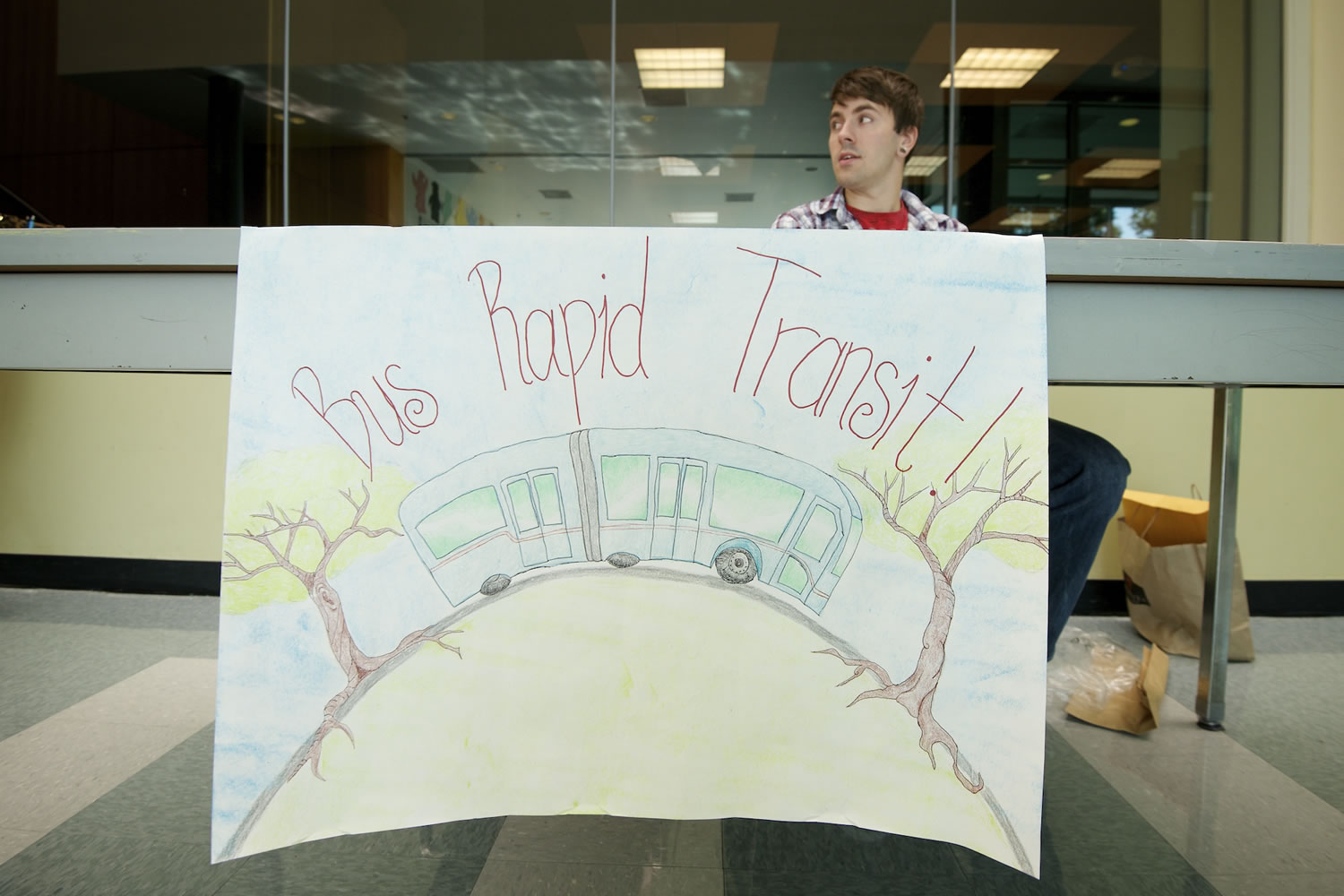It’s no surprise that light rail and the Columbia River Crossing have largely dominated the talk surrounding C-Tran’s Proposition 1. Both politically charged issues had a yearslong head start on the sales tax measure now tied to them this fall.
Often overshadowed in the debate is bus rapid transit, the lesser-known proposed beneficiary of Proposition 1.
“What I’ve noticed is that people are hardly aware of BRT at all,” said Vancouver resident Harry Kiick, a frequent C-Tran rider.
Kiick and a small group of Vancouver residents are trying to change that. They’re hoping to turn the conversation away from light rail and toward a BRT system they say would bring a welcome boost to Vancouver’s Fourth Plain community. A few supporters on Wednesday handed out fliers and information at Clark College. They have a handful of events planned for this month.
One problem: Getting people to vote for BRT also means getting them to vote for light rail funding — a tough pill to swallow for CRC opponents, regardless of how they feel about BRT. Some CRC and light rail backers have said they’re not on board with a sales tax hike to help pay for it, and thus oppose Proposition 1.
All of that leaves bus rapid transit advocates with an uphill climb to get support — and before that, get noticed.
“That’s what we’re going to need to do,” Kiick said.
If approved, Proposition 1 would raise the local sales tax rate by 0.1 percentage point within the C-Tran service area. The resulting revenue — about $4.6 million annually at first — would cover the cost of operating light rail in Vancouver, and help build a bus rapid transit line on the city’s Fourth Plain corridor.
Bus rapid transit uses larger vehicles, raised boarding platforms, specialized signals and other features in an effort to move passengers more quickly and efficiently. Vancouver’s proposed system, stretching from downtown to the Westfield Vancouver mall, would cost an estimated $40 to $55 million. Project leaders have said about 70 percent of that could be covered by federal grants.
Critics have characterized BRT as an ill-advised initiative with too much cost and too little benefit. But the concept cleared the C-Tran board, Vancouver City Council and Southwest Washington Regional Transportation Council, all of which signaled their approval earlier this year.
Among the residents now supporting bus rapid transit is Derya Ruggles, who lives in Vancouver’s newly formed Maplewood neighborhood. Bringing the system to the city’s Fourth Plain corridor would improve the area and build community, Ruggles said. She feels bus rapid transit is worth pursuing with or without light rail, which is planned as part of the $3.5 billion CRC project.
“To me, it’s a solution,” Ruggles said of BRT. “It’s going to revitalize the whole neighborhood.”
Kiick agreed.
“The BRT is not just buses,” Kiick said. “It’s making Fourth Plain a better place to be once you get there.”
On Wednesday, Clark College student Madison Syverson helped run the campus table promoting BRT at Gaiser Hall. She and Kiick set up next to a voter registration table, which may have been a benefit. Syverson, 19, said many of her peers simply aren’t plugged into local politics like older voters are.
Should Proposition 1 fail, what happens next is unclear. C-Tran must come up with some kind of local funding before it can receive a federal grant for bus rapid transit. It will ultimately be up to the C-Tran board to decide how to proceed if voters say no to a sales tax hike, said C-Tran public affairs director Scott Patterson. If it decides to press forward without a sales tax increase, the agency may have to settle on another plan as soon as next year if it hopes to keep the BRT project on its current timeline.
Ruggles and Kiick said they see BRT and light rail as two separate issues, despite efforts to connect the two. Proposition 1 may decide the fate of both on Nov. 6.
Eric Florip: 360-735-4541; http://twitter.com/col_enviro; eric.florip@columbian.com.




